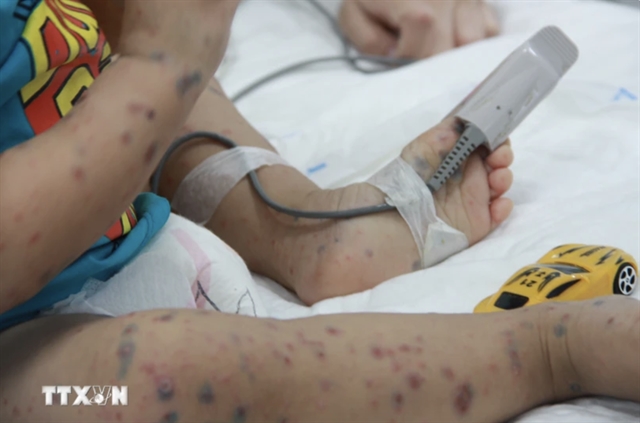 Society
Society

 |
| A child infected with hand-foot-mouth disease. VNA/VNS Photo |
HÀ NỘI – The country has recorded 10,196 cases of hand-foot-mouth disease in the first three months this year, an increase of 2.3 times compared to the same period in 2023, said Dr. Hoàng Minh Đức, director of the Department of Preventive Medicine (Ministry of Health).
More than 7,500 cases occurred in the southern provinces, accounting for 74.1 per cent of the total number of cases in the country, while there were 1,300 cases in the northern region and about 1,000 in the central region. The Tây Nguyên (Central Highlands) region has recorded the lowest number with 200 cases.
To date, there have been no recorded deaths due to the disease. The cases are mainly in preschool education facilities, with over 90 per cent of infections among children under 5 years old.
According to the doctor, there is currently no vaccine to prevent the disease, that is transmitted mainly through the digestive tract from saliva, blisters and faeces of infected children, leading to the risk of disease transmission at collective activities at preschool educational establishments.
However, the epidemic supervision, prevention and control at preschool educational establishments are not effective, said the doctor.
To proactively prevent the disease, the Ministry of Health recommends people to follow these instructions:
- Wash your hands regularly with soap under running water several times a day (both adults and children), especially before preparing food, eating/feeding children, holding children, and after eating, going to the toilet, changing diapers or cleaning children.
- Eat only cooked food, and eating utensils must be washed thoroughly before use (preferably soaked in boiling water); use clean water in daily activities, do not let children eat with their hands, suck hands, or suck on toys; do not let children share napkins, handkerchiefs or eating utensils such as cups, bowls, plates, spoons or unsterilised toys.
- Regularly clean contact surfaces and tools such as toys, learning tools, door handles, stair handrails, table/chair surfaces, and floors with soap or regular detergents.
- Do not let children come into contact with people who are sick or suspected of being sick.
- Use hygienic toilets. The patient's faeces and other waste must be collected and dumped into toilets.
- If a child has signs of suspected illness, take him or her to see a doctor or immediately notify the nearest medical agency. VNS




